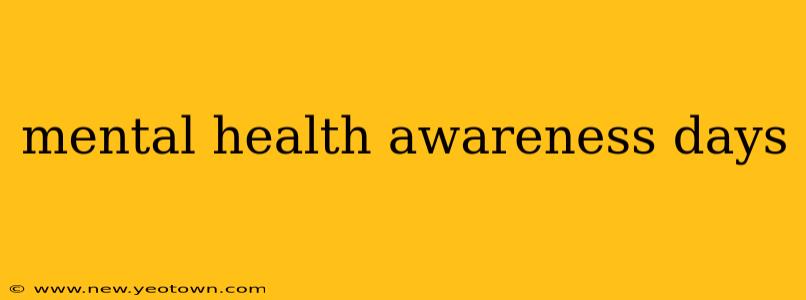Mental health. It's a topic that, until recently, was often whispered about, shrouded in stigma and misunderstanding. But times are changing. More and more, we're seeing a global shift towards open conversations, increased awareness, and a greater commitment to supporting those struggling with their mental wellbeing. This journey towards understanding is significantly aided by dedicated Mental Health Awareness Days, events that serve as powerful spotlights illuminating the importance of mental health and the resources available to help.
Let's embark on a journey through the landscape of these crucial awareness days, exploring their significance and how they contribute to a more compassionate and supportive world.
What are the main Mental Health Awareness Days?
While many countries and organizations have their own specific awareness days or weeks, some key dates stand out on the global calendar. These dates aren't just about raising awareness; they're about fostering hope, promoting action, and building community. The impact of these days goes far beyond a single 24-hour period; they initiate conversations that continue throughout the year.
When is World Mental Health Day?
World Mental Health Day, observed annually on October 10th, is arguably the most significant date on the mental health calendar. It's a day dedicated to raising awareness of mental health issues around the world and mobilizing efforts in support of mental health. Each year, the World Federation for Mental Health (WFMH) chooses a theme to focus global attention on a specific aspect of mental health. This targeted approach allows for a deeper dive into particular challenges and promotes specific solutions. It's not just a day of reflection; it's a call to action.
What are some other important mental health awareness events?
Beyond World Mental Health Day, numerous other observances contribute to the broader movement. Many organizations and countries dedicate specific weeks, months, or even entire years to focusing on mental health. This sustained effort ensures that the conversation remains ongoing, constantly reaching new audiences and reinforcing the message of support. This consistent presence in the public consciousness is vital to dismantling stigma and fostering a more understanding environment.
How can I get involved in Mental Health Awareness Days?
Participation in mental health awareness days isn't limited to large-scale initiatives. Every individual can play a role in making a difference. Here are some ways you can actively contribute:
- Educate yourself: Learn more about various mental health conditions, their symptoms, and available treatments. Knowledge is power when it comes to breaking down stigma and understanding the needs of others.
- Start conversations: Talk openly and honestly about mental health with friends, family, and colleagues. Create a safe space for sharing experiences and offering support.
- Share your story (if comfortable): Sharing personal experiences can be incredibly powerful in helping others feel less alone.
- Support mental health organizations: Donate to or volunteer with organizations working to improve mental health services and raise awareness.
- Advocate for change: Contact your elected officials and advocate for policies that support mental health initiatives.
By actively participating in these efforts, we collectively contribute to a world where seeking help for mental health concerns is not only accepted but encouraged.
What resources are available for mental health support?
Knowing where to turn for help is crucial. A variety of resources exist to provide support and guidance for those struggling with their mental health. These can include:
- Mental health professionals: Therapists, counselors, psychiatrists, and other mental health professionals offer evidence-based treatments for a wide range of mental health conditions.
- Support groups: Connecting with others who share similar experiences can provide valuable emotional support and a sense of community.
- Online resources: Numerous websites and apps offer information, support, and self-help tools for managing mental health.
- Crisis hotlines: In times of crisis, crisis hotlines provide immediate support and can connect individuals with emergency services.
Remember, seeking help is a sign of strength, not weakness. There is support available, and reaching out is the first step towards recovery and well-being.
The journey towards better mental health is a collective one. Mental Health Awareness Days serve as vital milestones along the way, reminding us of the ongoing importance of compassion, understanding, and unwavering support. By continuing to engage with these initiatives and actively contributing to the conversation, we can work together to build a healthier and more supportive world for all.

